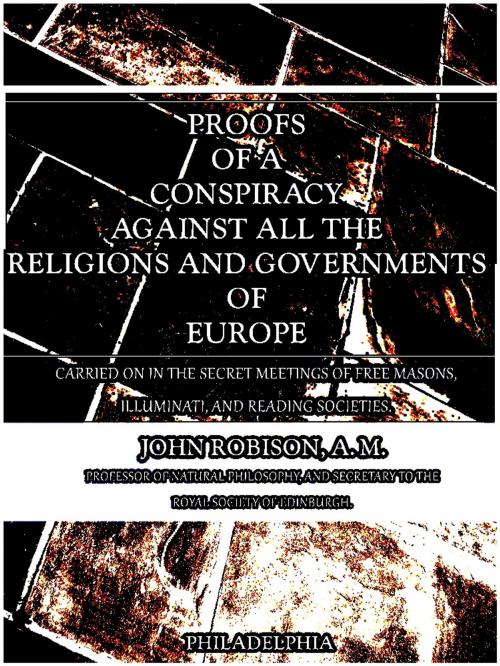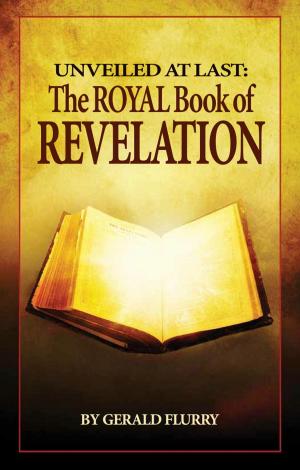Proofs of a Conspiracy against all the Religions and Governments of Europe
carried on in the secret meetings of free masons, illuminati, and reading societies.
Nonfiction, Social & Cultural Studies, Political Science, International, Religion & Spirituality| Author: | John Robison | ISBN: | 1230000309111 |
| Publisher: | PHILADELPHIA | Publication: | March 4, 2015 |
| Imprint: | Language: | English |
| Author: | John Robison |
| ISBN: | 1230000309111 |
| Publisher: | PHILADELPHIA |
| Publication: | March 4, 2015 |
| Imprint: | |
| Language: | English |
Example in this ebook
Being at a friend's house in the country during some part of the summer 1795, I there saw a volume of a German periodical work, called Religions Begebenheiten, i. e. Religious Occurrences: in which there was an account of the various schisms in the Fraternity of Free Masons, with frequent allusions to the origin and history of that celebrated association. This account interested me a good deal, because, in my early life, I had taken some part in the occupations (shall I call them) of Free Masonry; and, having chiefly frequented the Lodges on the Continent, I had learned many doctrines, and seen many ceremonials which have no place in the simple system of Free Masonry which obtains in this country. I had also remarked, that the whole was much more the object of reflection and thought than I could remember it to have been among my acquaintances at home. There, I had seen a Mason Lodge considered merely as a pretext for passing an hour or two in a sort of decent conviviality, not altogether void of some rational occupation. I had sometimes heard of differences of doctrines or of ceremonies, but in terms which marked them as mere frivolities. But, on the Continent, I found them matters of serious concern and debate. Such too is the contagion of example, that I could not hinder myself from thinking one opinion better founded, or one Ritual more apposite and significant than another; and I even felt something like an anxiety for its being adopted, and a zeal for making it a general practice. I had been initiated in a very splendid Lodge at Liege, of which the Prince Bishop, his Trefonciers, and the chief Noblesse of the State were members. I visited the French Lodges at Valenciennes, at Brussels, at Aix-la-Chapelle, at Berlin, and Koningsberg; and I picked up some printed discourses delivered by the Brother-orators of the Lodges. At St. Petersburgh I connected myself with the English Lodge, and occasionally visited the German and Russian Lodges held there. I found myself received with particular respect as a Scotch Mason, and as an Eleve of the Lodge de la Parfait Intelligence at Liege. I was importuned by persons of the first rank to pursue my masonic career through many degrees unknown in this country. But all the splendor and elegance that I saw could not conceal a frivolity in every part. It appeared a baseless fabric, and I could not think of engaging in an occupation which would consume much time, cost me a good deal of money, and might perhaps excite in me some of that fanaticism, or at least, enthusiasm, that I saw in others, and perceived to be void of any rational support. I therefore remained in the English Lodge, contented with the rank of Scotch Master, which was in a manner forced on me in a private Lodge of French Masons, but is not given in the English Lodge. My masonic rank admitted me to a very elegant entertainment in the female Loge de la Fidelité, where every ceremonial was composed in the highest degree of elegance, and every thing conduced with the most delicate respect for our fair sisters, and the old song of brotherly love was chanted in the most refined strain of sentiment. I do not suppose that the Parisian Free Masonry of forty-five degrees could give me more entertainment. I had profited so much by it, that I had the honour of being appointed the Brother-orator. In this office I gave such satisfaction, that a worthy Brother sent me at midnight a box, which he committed to my care, as a person far advanced in masonic science, zealously attached to the order, and therefore a fit depository of important writings. I learned next day that this gentleman had found it convenient to leave the empire in a hurry, but taking with him the funds of an establishment of which her Imperial Majesty had made him the manager.
To be continue in this ebook
Example in this ebook
Being at a friend's house in the country during some part of the summer 1795, I there saw a volume of a German periodical work, called Religions Begebenheiten, i. e. Religious Occurrences: in which there was an account of the various schisms in the Fraternity of Free Masons, with frequent allusions to the origin and history of that celebrated association. This account interested me a good deal, because, in my early life, I had taken some part in the occupations (shall I call them) of Free Masonry; and, having chiefly frequented the Lodges on the Continent, I had learned many doctrines, and seen many ceremonials which have no place in the simple system of Free Masonry which obtains in this country. I had also remarked, that the whole was much more the object of reflection and thought than I could remember it to have been among my acquaintances at home. There, I had seen a Mason Lodge considered merely as a pretext for passing an hour or two in a sort of decent conviviality, not altogether void of some rational occupation. I had sometimes heard of differences of doctrines or of ceremonies, but in terms which marked them as mere frivolities. But, on the Continent, I found them matters of serious concern and debate. Such too is the contagion of example, that I could not hinder myself from thinking one opinion better founded, or one Ritual more apposite and significant than another; and I even felt something like an anxiety for its being adopted, and a zeal for making it a general practice. I had been initiated in a very splendid Lodge at Liege, of which the Prince Bishop, his Trefonciers, and the chief Noblesse of the State were members. I visited the French Lodges at Valenciennes, at Brussels, at Aix-la-Chapelle, at Berlin, and Koningsberg; and I picked up some printed discourses delivered by the Brother-orators of the Lodges. At St. Petersburgh I connected myself with the English Lodge, and occasionally visited the German and Russian Lodges held there. I found myself received with particular respect as a Scotch Mason, and as an Eleve of the Lodge de la Parfait Intelligence at Liege. I was importuned by persons of the first rank to pursue my masonic career through many degrees unknown in this country. But all the splendor and elegance that I saw could not conceal a frivolity in every part. It appeared a baseless fabric, and I could not think of engaging in an occupation which would consume much time, cost me a good deal of money, and might perhaps excite in me some of that fanaticism, or at least, enthusiasm, that I saw in others, and perceived to be void of any rational support. I therefore remained in the English Lodge, contented with the rank of Scotch Master, which was in a manner forced on me in a private Lodge of French Masons, but is not given in the English Lodge. My masonic rank admitted me to a very elegant entertainment in the female Loge de la Fidelité, where every ceremonial was composed in the highest degree of elegance, and every thing conduced with the most delicate respect for our fair sisters, and the old song of brotherly love was chanted in the most refined strain of sentiment. I do not suppose that the Parisian Free Masonry of forty-five degrees could give me more entertainment. I had profited so much by it, that I had the honour of being appointed the Brother-orator. In this office I gave such satisfaction, that a worthy Brother sent me at midnight a box, which he committed to my care, as a person far advanced in masonic science, zealously attached to the order, and therefore a fit depository of important writings. I learned next day that this gentleman had found it convenient to leave the empire in a hurry, but taking with him the funds of an establishment of which her Imperial Majesty had made him the manager.
To be continue in this ebook















